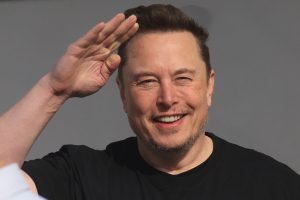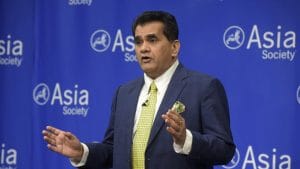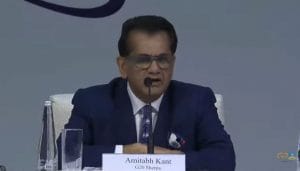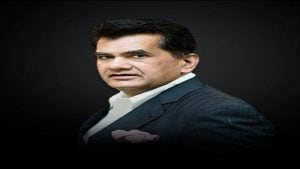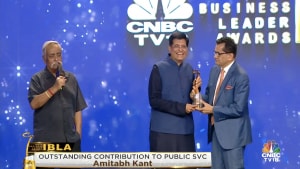Climate, energy, and geopolitics were key challenges at the start of G20 summit, says Amitabh Kant

KV Prasad Jun 13, 2022, 06:35 AM IST (Published)
 Listen to the Article (6 Minutes)
Listen to the Article (6 Minutes)
Summary
Amitabh Kant, India’s G20 Sherpa, has revealed insights into the process behind crafting the Delhi declaration. Notably, during the discussions, it was a strict policy that no Sherpa carried a mobile phone. They engaged in a remarkable 200 bilateral meetings and meticulously prepared 15 drafts before arriving at the final declaration.
Amitabh Kant, India’s G20 Sherpa, has revealed insights into the process behind crafting the Delhi declaration. Kant described this endeavor as exceptionally challenging and intricate, yet he remained resolute in pushing the boundaries.
He pointed out that his previous exhaustive work on various other issues left only the daunting challenges of climate, energy, and geopolitics to tackle. To maintain confidentiality, the Sherpas were secluded in Manesar, located nearly 60 kilometers outside Delhi.
Stringent measures were taken to prevent information leaks, especially during discussions on geopolitics, where attendees were prohibited from having mobile phones. Their sole means of communication with their leaders was taking minimal notes. This strict confidentiality was imperative because any leaks to the media regarding the draft documents had the potential to disrupt the entire geopolitical agreement. Thus, keeping the process behind closed doors was of paramount importance.
Here are edited excerpts:
Q: I want to start with that afternoon on Friday, where you had that press conference, you were sitting there, the Foreign Secretary was there, G20. coordinator, Harsh Vardhan Shringla was there and everyone kept asking you the same question. Will you arrive at a consensus or not? At that point, when I looked at your body language, you were of course saying the right things that you would be able to hammer through a consensus but your body language suggested that you weren’t that confident, am I right?
A: Well, it was very tough. It was very complex, but I was very sure that I will push it to the limits. The good thing was that I had already worked very hard on all other issues. So the challenge left was climate, energy and geopolitics, of course. So we had sealed, when the Sherpas came into Delhi, we took them almost 60 kilometres out of Delhi to Manesar, we close them up. We ensured that there was no leakage of information and every time we had a meeting on geopolitics, we ensured that no one came with a mobile phone. So there were no mobile phones. They could only take a little bit of notes to convey to their leaders. The challenge was if there was if the drafts were leaked out to the media, then the whole geopolitical settlement would get wrecked. It was very important to keep it in closed doors.
Q: How many drafts were there?
A: I think we worked through about 15 drafts, we started off on the – they all came in on third. The Sherpas had come in by the fourth morning and we started on the fourth morning with a blank screen and the drafting session, because we could have started with Para III and IV of Bali. But I was quite sure if we start with that we will never achieve consensus. So we had to start afresh. So I said keep III and IV in your mind. But we will do fresh. So we took the screen and I drafted 15 principles, I dictated 15 principles in front of them. And then I asked them what they wanted to add. So the G7 added a number of more things and then China added a few things and then emerging markets added a number of things and then Russia added. So we had a number of things and after hearing everybody and the process of drafting was going right in front of everyone, all the 20 Sherpas. And then I said, will prepare a draft and I told them that India, Brazil, and South Africa are going to work together. These three Sherpas are going to work together and we will prepare a draft based on the inputs received, which will be a balanced draft, taking everybody’s views into consideration.
The very next day, we worked all night and we came back with a revised draft in the morning. When we had a meeting these people had different viewpoints, many more viewpoints. We listened to everyone and these drafts went up and down about 15 times. In addition to the 15 drafts, we also had several rounds of bilateral. I think I must have held about 200 bilaterals. In that period from morning to night, I used to meet all the Sherpas individually, from morning to night, so all the G7, then emerging markets, then China, then Germany, it was very important to explain to them and also important to understand their red lines, also important to tell them that we are going to do a fair transparent job. We kept listening to everyone, hearing everybody and telling them what the challenge from the other side was. And then we kept moving the draft, we kept going through it and everybody had challenges. But finally, after many, many rounds of discussion, bilaterals, etc. and I presented it in the morning. There were still many, many issues from the side of G7 as well as from Russia. And finally, we heard everybody out.
We took the draft we sent it to Moscow. They had a number of issues. They had a number of issues on this because we had brought in direct principles of territorial acquisition of territorial integrity, of sovereignty, of political independence. Also, it is important to understand that the statement recalls Bali, and then it takes it to another level and then says that there must be territorial integrity, there must be sovereignty, there must be political independence, there should be no territorial acquisition. So actually, it’s a far stronger statement than Bali ever was.
Q: Ukraine doesn’t see it that way?
A: Ukraine may not, but you have to read it, along with Bali. Ukraine once outright condemnation, it can’t be that G20 starts condemning, deploring its own member. Even in Bali, it did not do that, it used the UN resolution to condemn, but we have quoted the UN resolutions also. So we got the UN resolution, we recall Bali, and then we move on into the strong principles. Our view was that it’s important at this point of time to bring moderation. Emerging markets got together to say that for us, developmental issues are more important, and growth issues are more important. SDG implementation is far more important than just focusing on one issue of the war.
We kept telling the G7 that for you war may be important, but for us growth, development, progress, implementation of SDG, digital transformation, all this is really the key to the future. If we are not able to handle these issues, we don’t want to touch the issues of geopolitics.
Finally, we were able to convince them, but to my mind, the reading of the geopolitical paras is very, very strong, it’s very leaders-like. In a leader statement, you don’t get the voting pattern, you just don’t start seeing some, many, few, which had happened, because there was no other option. But I think we have moved on from Bali, we have moved on from Bali into a statement, which is truly, where the ethos is Indian because it also talks about one earth, one family, one future. It also talks about today’s era not being of war, that’s how it ends up very strongly.
So to my mind, it’s a very, very strong statement and it’s important for people all across the world to read it again and again realising that it recalls Bali, realising that it also quotes the UN resolutions, realising also that it pins down everyone in the world, including Russia, to not have territorial acquisitions, to have territorial integrity, to have political independence and to have sovereignty of nations.
Q: You said in many ways, that it was the emerging world that came together because they saw this as an inflection point that look, we need to focus on priorities that are important to us. But what did it take to actually get the G7 to see it that way?
A: So one is that constant talking, constant interaction with the G7 that we believe in certain principles, we believe in the UN charter, we believe in the UN principles and we wanted to reiterate that. We also recall Bali it’s not that we don’t recall Bali. We also reaffirm the UN resolutions all is there. So you don’t have to repeat Bali all over again. You had moved on. We are a year on and we have seen that the Bali statement didn’t even last 30 days. You know from the first meeting till the 14th we have had the Bali para, we have not been able to have consensus on the Bali para. We wanted a resolution which will have longevity, which will stand the test of time, which both sides will really understand. I don’t think this kind of work could have been done by the UN Security Council or the United Nations what India has been able to achieve.
Q: Why do you believe that’s the case? Why do you think that India was able to do what you believe the UN Security Council would not have achieved?
A: I think because India was a voice of moderation. India brought Brazil, South Africa, and Indonesia together. We brought all the emerging markets together. We brought Saudi, we brought Mexico, we brought Argentina, all of them together. And finally, we brought China together into this and we put pressure and everyone agreed and 20 countries agreed on the Russia-Ukraine issue – unbelievable.
Q: On China specifically and you said that Moscow had a lot of problems even with the final draft that was finally put out, but what about China and the fact that China came on board?
A: So China, we were constantly in discussion with them bilaterally. We had had several rounds of discussion. They had told us that they would agree to this, in case Russia agreed. They were fully backing Russia, they would have not agreed to this if Russia had not agreed. And when had convinced Russia entirely that it was good for them to fall in line. They had issues till about 3:30 in the morning. So we had to spend time with the negotiators till 3:30 am in the morning. We convinced them finally, and then we told the Chinese that the Russians had agreed, so the Chinese agreed, but they had a bilateral issue with the USA.
They said that they will agree to this only if that bilateral issue was settled with the United States. It had nothing to do with this resolution, it was some other issue. Then we made the Americans and the Chinese sit down in the morning after the meeting had started, the meeting, we had a resolution on this. We had a resolution and everything else. However, the bilateral issue between the US and the Chinese are not being sorted that also we sorted.
Q: So on Saturday morning got resolved that is what finally led to the breakthrough?
A: That led to the breakthrough and we ensured that the Chinese and the US bilateral issue also got sorted out. And we played a key role in that as well.
Q: Many people are calling you the weapon of mass diplomacy. That is what Anand Mahindra has tweeted. In your career bureaucrat has this been the hardest assignment? What has this taught?
A: This was very tough. This was very tough, but I was very fortunate. I was fortunate because someday good colleagues. First of all, the Brazilian Mauricio was very good. The South African Sherpa was an outstanding international legal expert. On our side, we had Nagaraj Naidu, an outstanding civil servant. He has experience with the United Nations so he is a top-class, really top-class drafter. And I had Eenam Gambhir who’s very motivated, enthusiastic, and was never pessimistic. So always looking forward. So you need to have a lot of guts, you need a lot of courage, and you need it to be a risk-taker. I just took the risk.
In the ultimate analysis, finally, when the last meeting ended in the night, I just told them, this is the draft that my leader had seen and he agreed with it. And I just pulled all the strength of my leader, and that’s the Prime Minister and I said, my leader wants all consensus. He doesn’t want a divided G20. He doesn’t want to wreck G20. He wants only a consensus and this is the final draft with four of us. By that time Indonesia had joined us, this is the best possible draft which will be green by the morning. So I left it at that at about 12 pm in the night by morning 6 am. And when I got up, I had confirmation from the EU, I had confirmation from Germany, I had confirmation from Canada so it was taking brinkmanship to its last.
Q: So by the wee hours on Saturday morning, you felt confident that you would have a breakthrough?
A: Absolutely confident, nobody believed me. But by that time I was absolutely sure that I’ll drive it and I took it to the last. I didn’t want to hold the meeting early because I knew they would get into discussions and debate again. I didn’t want to discuss it any further because I had already done 200 rounds of negotiations. So I just took it to the last and I said this is the best possible draft. This takes care of everybody’s red lines. This takes care of everybody’s interests. And here it is. This is the final draft no more discussion.
If your leader has anything to say, go and tell my leader, Sherpas won’t discuss it anymore. And that’s where things fell into place. I knew by that time, that I had already had all the emerging markets with me, and China and Russia still opposing it, but I was pretty sure I will push it down that line. And I told Russia that if you didn’t agree in the night after I had done this, I went and told them that if you don’t agree we’ll make it 19-1. So I was just doing gutsy courageous brinksmanship to the last.
Q: At the end of 200 hours of negotiating what has been the big learning for you in terms of the power of negotiating itself?
A: It was a very unconventional negotiation. This is not the normal type of diplomatic negotiations. I could do this because I had the full authority and backing of my Prime Minister who’s my leader, in this case, and I have his stature and standing in the international arena is very high.
The French had an issue but I was very sure that Macron will not have the courage to tell my Prime Minister that you change this word into that. They had some issues, the Germans had some issues but I made all of them fall in line. If you go by everybody’s because G7 comprises of seven nations. They keep coming and telling you to change this, change that, it will never work. I had heard them 200 times what more can I do? So I couldn’t have done anything more. I told them, this is the best best best draft you can ever get. This takes care of all your positions. This takes care of China, this takes care of Russia, and this takes care of all emerging markets. And then I had to throttle it down.
Q: Outside of the New Delhi declaration, and the fact that this turned out to not create history in the wrong way not to be the G20 that didn’t actually have a communique out? (Interrupted)
A: So let me just say a little bit on this because it’s a voice of moderation. There is a lot of waste of the Global South in this, emerging markets have had a say it, and it’s a very balanced draft. To my mind, it takes care of everybody’s concerns. So this should be a piece of document, which should really work for everyone for a long period of time for. Also, it brings multilateralism back to center stage. Multilateralism hasn’t worked for a very long time. But India has demonstrated that multilateralism can work and will work. We have created a document, the New Delhi leaders document is a very progressive forward-looking document on a range of issues.83 paras, we’ve had no dissent whatsoever, anywhere. It’s the only document which on all issues, all issues has had consensus.
Q: Yes, 83 paras versus 52 in Bali, and of course, a whole host of substantive issues being discussed. But let me pick up two of those. And let’s start by talking about the economic corridor, I want to understand what went into actually ensuring that that announcement was a reality here at the G20. We heard from President Biden in his press conference, he said that he had proposed this because he believes the economic corridors are the role of the future. But take me through what went into negotiating this aspect.
A: So this had been coming from the USA for a long time. And they had thought it through and we discussed it, they had discussed it with other countries, and they wanted to propose it. It is very much like our own Delhi-Mumbai industrial corridor. But it’s a great concept. It’s a brilliant concept. In terms of its outlook and perspective, it is truly unique. All we need to do is to get down to actually getting the project reports, right, get the implementation, right. It can have a huge impact globally, and it can be greatly beneficial to India, in the long run this corridor.
Q: So who was steering negotiations, as far as the corridor was concerned, of course, it was proposed by the US.
A: They had come to me initially, they had discussed this several times. And then finally, it was driven by the NSA. We were caught up in G20 at that point in time, but all of us were involved in this and the NSA drew it MEA was involved, and everyone is involved.
Q: This is also in a way, perhaps one of the most significant challenges to China’s infrastructure, muscle and infrastructure, diplomacy and the Belt Road initiative. What was the approach, and what was the thinking, as part of the negotiations? Was that in the backdrop all the time as you were negotiating this agreement?
A: So a couple of things. One is that Americans wanted this, they were very clear. We were keen that this should go through it is in the interest. There were many other countries, the Germans, the French, the Saudis, and the Omanis all wanted it, and therefore, we pushed it through. But it’s important we use the G20 opportunity to have this rolled out. But still, a lot of speed work needs to be done. We need to take it to its execution level, and then finally take it to its financing and then getting the private sector involved. So a huge amount of work still needs to be done. But it’s a phenomenal project in terms of its scale, in terms of its bandwidth, in terms of its long-term impact. It’s a great project.
Q: What you’ve just articulated as the positives, the pros, the scale of aspiration, the length and breadth of what is hoping to be done, could that also then be the pitfall in terms of execution and the execution challenges linked to it?
A: I think what you need now is to truly spell out the broad contours, and get detailed project reports done. Lay out the clear financing pattern, and get the financing agencies involved. We will work on it to take it forward. But it’s an abroad line like what the Delhi-Mumbai corridor was that you will have these corridors, you will have a freight line running, you will have information technologies, many other components to it. So I think India is quite used to this Gati Shakti approach now, and we will be able to push it.
Q: Speaking of Gati Shakti, one of the other announcements that came in with the account was, of course, the announcement as far as the inclusion of the African Union as a permanent member of the G20. And this is something that India had committed to and it was a work in progress ever since our presidency started. Was that unanimity right through on this issue, or was that hard bargaining even on this one?
A: So the letter of the Prime Minister to the heads of state had made a lot of difference. The majority of the countries were fully in agreement with the African Union getting involved. There were two or three challenges that we were able to discuss in the Sherpa track and sort out. Before the physical Sherpa meeting happened, we had brought everybody together to agree to, and therefore there was broad consensus around it.
Q: One of the big issues when we talk about Africa, and you know, the hope is that with this there will be a move towards further economic resilience, more integration, economic integration. The call for addressing the debt of Africa, and perhaps even the possibility of a debt reset, how much of that was part of the deliberations and the discussions?
A: That was discussed in the finance track, that’s a finance track issue. It’s an important issue because if 75 countries of the world are facing a global debt challenge, I think much more needs to be done. That is an issue. It’s been done for Zambia, it’s still to be done with many other countries. But I think that’s an important issue. But that’s an issue which the finance track will take forward.
Q: Of all the issues 83 paras dealt with a whole host of issues from crypto regulation, which was, of course, part of the finance track to digital public infrastructure to climate, which were the hardest ones to build consensus outside of Russia and Ukraine.
A: The hardest ones to negotiate were climate, energy, and finally, geopolitics. The climate was very tough. The ambition level was very high, getting countries to commit to tripling renewables, to cutting down fossil subsidies, to raising their ambition on the use of fuels, to limiting unabated fossil fuels. Saudi had very strong red lines, so we had to bring them down, negotiate and bring them down on a number of things. They were not agreeing to tripling renewable energy also. So there were huge challenges and we were able to get them around on a number of issues and bring consensus. Just about everything we brought consensus. We used many, many ways to do this.
Q: What ways did you use to arrive at a consensus on climate issues?
A: You see, the challenge was that it was very important to convince them that like we have done ourselves going renewable is the right thing. We have achieved a lot and we are very confident we’ll be able to triple our renewable energy. And if anybody has got better weather conditions, then ask to go in for renewable at Saudi. So we had to talk a lot. We had many bilateral discussions. So to be able to succeed multilaterally, you have to succeed bilaterally as well. And that was very important. We had to do that many, many times. And I think one lesson of all this is that you have to deal bilaterally, you have to be well-intentioned and thirdly, you have to know where the interest of the other country lies. And therefore, you have to handle two or three issues together to be able to sort it out.
Q: Speaking of handling several issues at the same time what I want to understand from you now is one, is there going to be a virtual summit in November? That is what the Prime Minister has proposed, you believe that we are going to see one in November. And more importantly, it’s, as you pointed out, it’s a substantive document that’s been put together. Brazil now takes over the presidency. What’s the hope from here, as far as the New Delhi leader’s declaration is concerned, as you said, Bali one para was forgotten very quickly, what is the hope with this one?
A: Very much, very much. It is a very good document, and I think everybody has agreed to it. In Bali, there was no consensus on global debt. There was a footnote of China. China agrees to global debt issues here and many other issues there is full agreement, so we will be able to take it forward. And it’s good that the prime minister said that get into focusing on implementation now. So if we get into focusing on implementation, we will be able to make another headway before we get into the virtual Summit. And then Brazil agreed to take them forward forever. They are taking forward a startup working group, our women’s working group, there’s a huge recommendation on women-led development and gender equality and women empowerment is a huge focus, no document in the world has had such a huge, overwhelming, emphasis on gender equality and women empowerment, and women-led development as our document has. There is a huge focus on Green Development Pact, which nobody has talked about, but there’s a huge, huge emphasis on green development.
Q: Many that I spoke to during the course of the last three days, we are in agreement that, G20, post India perhaps is going to look very different in the manner in which these summits are held. 200 meetings across 60 different cities, nothing like this has ever been done before, and perhaps may not be done again. We don’t know, but there seems to be a question mark on that. What was the idea behind this kind of showcasing that we attempted to do?
A: So our Prime Minister has a different vision and his view was that we should use this opportunity to really involve all the states, over 60 cities, who can then improve their infrastructure, their drainage, sewage, solid waste, and make it a people’s presidency, and involve the citizens through Model G20s. Have quiz contests, have essay contests, which we have done throughout the year. So every student now knows what our priorities are, and what is G20. And also on the content side, he had very clear views about building in the India narrative, on how to make it human-centric globalisation, how to focus on digital public infrastructure, and even the exhibition that you saw here was all about the digital public infrastructure. So he was very clear that we need to push the India narrative in this?
Q: What do you think is the biggest takeaway that world leaders, the people who have attended not just the final summit, but over the last 200 meetings, what do you believe is their big takeaway as far as India is concerned?
A: So I think, eventually, everything folds down to the final document. Because that’s the living legacy of whatever you do. And that truly is the voice of the Global South, that speaks the voice of the emerging markets. The document that has been written there is totally the voice of the developing nations for the first time. It’s a voice which truly balances out the interests of the developing countries and that is a remarkable feature of this. It also focuses on several new areas, like DPI, there’s no global financial architecture, but it brings in the discussion of artificial intelligence of leaders, and many more areas we still talked about, but it’s a path-breaking document to my mind.
Q: For you personally, what has this process been like, forget the past nine months, but specifically, the last three or four days? Have you gotten any sleep at all?
A: No, I have not gotten any sleep. So I need to sleep well. I will plan to do this in the subsequent days. And I really want to take a good rest and just chill out. But it’s very difficult to do this, with the Prime Minister putting us back into action, saying that there will be a virtual Summit, you get down to work. So I don’t think I will even get sleep.
Q: To chill out. But Shashi Tharoor tweeted, saying that the IFS lost an ace diplomat in you, Kant, how do you respond to that?
A: Very nice of him to say that, I have great regard and respect for them. I responded to him, which was that there’s no IFS, it was all about team spirit and it’s about working for the country, at the end of the day. So we work. But you know, I think in the end analysis, I could get all this consensus through largely because of the elevated stature of India. I think the stature and standing as a Prime Minister as the leader because I am only a Sherpa and Sherpa to the Prime Minister. So his standing and his stature, really, of being a Prime Minister in a democracy, that very high people’s credibility, very high, that enabled me to push through a lot. I took risks, but I think behind me was my leader standing whose vision helped me to push.
Q: So at the end of the G20 presidency, where do you believe India finds itself?
A: I think on the top of the ladder because no other country would have been able to achieve consensus which India has achieved. I don’t think any country in the world would have been able to achieve what India has achieved under Prime Minister Modi’s leadership.

Elon Musk forms several ‘X Holdings’ companies to fund potential Twitter buyout
3 Mins Read
Thursday’s filing dispelled some doubts, though Musk still has work to do. He and his advisers will spend the coming days vetting potential investors for the equity portion of his offer, according to people familiar with the matter

KV Prasad Journo follow politics, process in Parliament and US Congress. Former Congressional APSA-Fulbright Fellow



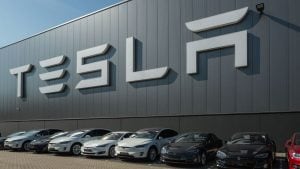






 Listen to the Article
Listen to the Article  Daily Newsletter
Daily Newsletter






